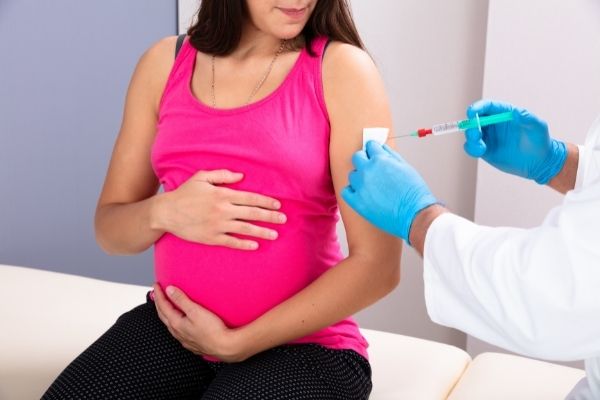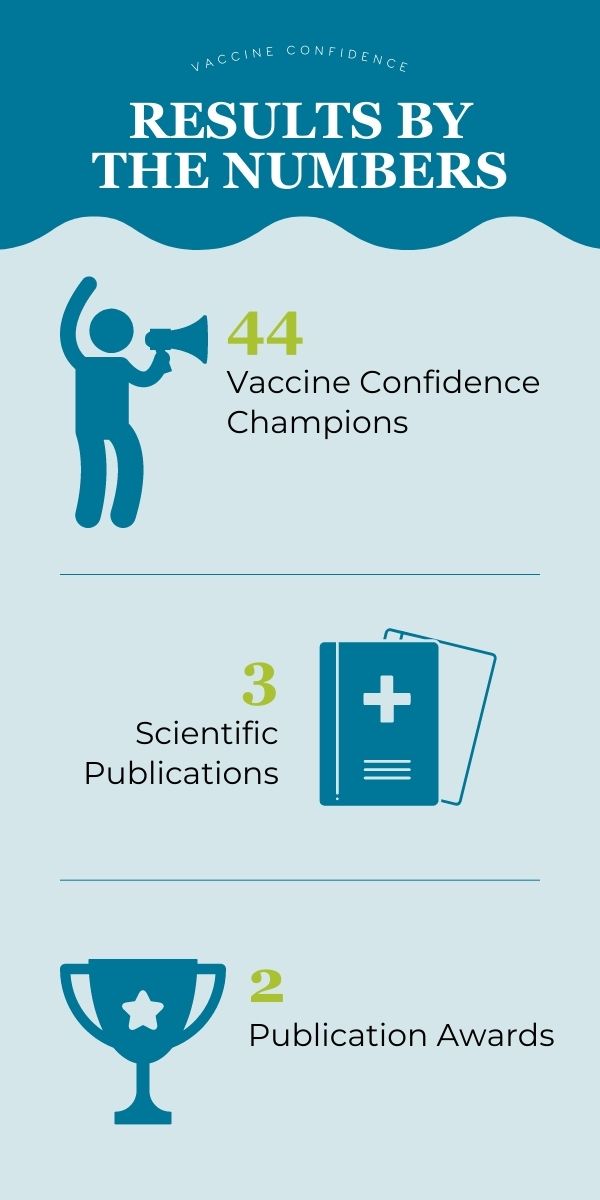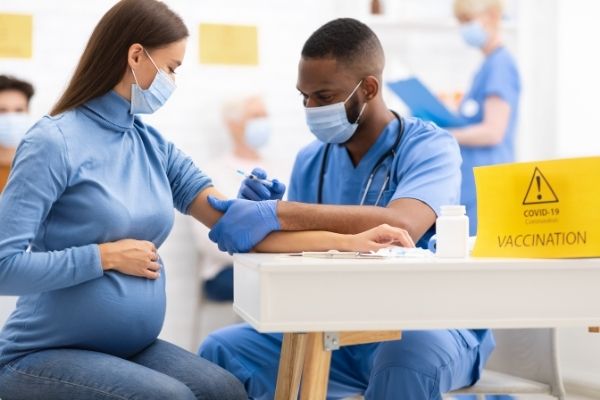Diverse Public Health Solutions for a Complex Global Pandemic
By Torey Repetski, Pooja Gandhi, and Roshni Devchand
Building on months of collaboration with the COVID-19 Vaccine Task Force, CDC continues to leverage Karna’s expertise on COVID-related projects for the American College of Obstetricians, CDC’s COVID-10 Epidemiology Task Force, and the Morbidity and Mortality Weekly Report.

Challenge
The COVID-19 pandemic was complex from the beginning. It was an entirely new, unstudied virus that was fast-spreading and rapidly evolving. The vaccines also used novel technology and were brought to market faster than typical vaccines. The Centers for Disease Control and Prevention enlisted Karna, LLC, in December of 2020 to assist the COVID-19 Vaccine Task Force (VTF) with building vaccine confidence and boosting demand. However, as political narratives continued to play out and vaccine misinformation became more widespread, the complexity of vaccine confidence issues deepened.
Building on months of collaboration with the COVID-19 VTF, Karna had established an in-depth understanding of population knowledge, attitudes, and behaviors toward the COVID-19 vaccines. This foundation led us to roll out successful communication efforts to address barriers among audiences such as parents of school-aged children, young adults, and other vaccine-hesitant populations. As such, Karna has continued to leverage this expertise and knowledge in support of other COVID-19-related projects for the American College of Obstetricians and Gynecologists (ACOG) , CDC’s COVID-19 Epidemiology Task Force, and the Morbidity and Mortality Weekly Report (MMWR). These partnerships continue to result in population research and provide up-to-the-minute, science-based recommendations to improve COVID-19 response and vaccine confidence and uptake, especially as they relate to areas such as maternal and veteran health.
Strategy & Solution
Karna collaborated with CDC and Brunet-Garcia Advertising to develop this public service announcement for expecting parents.
The pandemic has highlighted Karna’s ability to respond and adapt to a variety of challenges around COVID-19. Our thoughtful and targeted solutions contribute to public health research and response with some of the nation’s top organizations. The following examples are just a few of our completed and ongoing activities related to pandemic response.
Health Communications and Evaluation Support for Maternal Health
Pregnant people are at high risk for severe illness from COVID-19, affecting both themselves and their pregnancy. Fortunately, there are safe and effective vaccines to prevent severe illness, hospitalization, and death from COVID-19 during pregnancy. However, COVID-19 vaccine misinformation has led to high vaccine hesitancy among pregnant people.
To address this issue, Karna partnered with ACOG to develop the Inform to Empower campaign. Karna leads the strategy, development, and dissemination of trainings and toolkits for the campaign. Our effort focuses on equipping trusted clinicians and social media influencers with messaging, tools, and resources they need to increase vaccine confidence and uptake among pregnant people. Messaging is rooted in evidence-based clinical recommendations and answering patient questions—including directly addressing vaccine misinformation.
We have also assembled a Vaccine Confidence Champion Network that comprises diverse ACOG leaders from across the country. These Champions are serving as a resource for OB-GYNs seeking to increase COVID-19 vaccine uptake in their patient population.
In addition to our health communication work with ACOG, we designed and are executing an evaluation to assess the effectiveness of the trainings and toolkits used in the campaign. The evaluation gauges the resources’ ability to increase clinician knowledge and self-efficacy in having COVID-19 vaccine conversations with their patients and peers. Our approach to evaluation for this project includes developing logic models and evaluation instruments (e.g., survey questionnaires, interview guides) and collecting process metrics (e.g., training views, Champion engagement) and outcome metrics (e.g., changes in clinician knowledge, self-efficacy, and self-reported behaviors; vaccination rates).
Analytics, Health Communication, and Research to Support CDC’s COVID-19 Pandemic Response
Throughout the pandemic, Karna supported and continues to support CDC’s Epidemiology COVID-19 Task Force by conducting data analytics, research, and health communication. Since the beginning of our work with the Task Force, Karna offered program coordination and led data analyses for more than 20 surveillance enhancement sites, weekly data runs, data visualization, analytic troubleshooting, and reporting for the Optional Surveillance Enhancement Program for Influenza and SARS-CoV-2.
We expanded our work throughout the past year to include data management, analyses, and visualization for research on the Epidemiology of SARS-CoV-2 in Essential Response Personnel (HEROES-RECOVER) cohort study, which will continue to follow and collect data from essential workers during the pandemic. Our role includes developing written reports, tables and figures, slide presentations, and journal manuscripts.
We currently support the Surveillance Platform for Enteric and Respiratory Infectious Organisms in the Veterans Affairs population (SUPERNOVA), a laboratory-based passive surveillance platform for acute respiratory illness (ARI) focusing on COVID-19, to assess the epidemiology of COVID-19 cases among hospitalized adult U.S. veterans. This study looks at the safety and effectiveness of COVID-19 vaccines against laboratory-confirmed COVID-19 diagnoses, the burden of ARI caused by respiratory viruses, clinical severity of COVID-19 strains. The study also uses serum and plasma specimens collected from enrolled hospitalized patients to better understand correlates of protection and immune responses. Karna staff conduct partner site communications, data compilation, data collection instrument development, database creation and management, analyses, and manuscript development and publication for this project.
Karna also plays a role in responding to COVID-19-related email public inquiries with the latest, reliable, science-based health information as part of CDC INFO, CDC’s national contact center and publication fulfillment system, by creating prepared responses for routine questions and working with subject matter experts to create individualized responses when needed.
Lastly, Karna is involved with the production of the MMWR Weekly, Early Release, and Serial reports through technical writing and editing, desktop publishing, graphic design, web and print publishing, and web programming, all adhering to CDC standards and Section 508 requirements. MMWR’s mission is to be CDC’s primary voice for science-based public health information and recommendations. MMWR is used to communicate up-to-date scientific information as part of CDC COVID-19 Response efforts. Since the beginning of the pandemic, the MMWR team has released one COVID-19 report every 48 hours and has published 37 percent of all CDC COVID-19 publications. Each MMWR COVID-19 report averages 49.4 citations. With Karna’s support, MMWR remains one of CDC’s most respected publications, and it has received numerous awards as well as tremendous mainstream and social media attention during the pandemic.
Strategy & Solution
The pandemic has highlighted Karna’s ability to respond and adapt to a variety of challenges around COVID-19. Our thoughtful and targeted solutions contribute to public health research and response with some of the nation’s top organizations. The following examples are just a few of our completed and ongoing activities related to pandemic response.
Health Communications and Evaluation Support for Maternal Health
Pregnant people are at high risk for severe illness from COVID-19, affecting both themselves and their pregnancy. Fortunately, there are safe and effective vaccines to prevent severe illness, hospitalization, and death from COVID-19 during pregnancy. However, COVID-19 vaccine misinformation has led to high vaccine hesitancy among pregnant people.
To address this issue, Karna partnered with ACOG to develop the Inform to Empower campaign. Karna leads the strategy, development, and dissemination of trainings and toolkits for the campaign. Our effort focuses on equipping trusted clinicians and social media influencers with messaging, tools, and resources they need to increase vaccine confidence and uptake among pregnant people. Messaging is rooted in evidence-based clinical recommendations and answering patient questions—including directly addressing vaccine misinformation.
We have also assembled a Vaccine Confidence Champion Network that comprises diverse ACOG leaders from across the country. These Champions are serving as a resource for OB-GYNs seeking to increase COVID-19 vaccine uptake in their patient population.
In addition to our health communication work with ACOG, we designed and are executing an evaluation to assess the effectiveness of the trainings and toolkits used in the campaign. The evaluation gauges the resources’ ability to increase clinician knowledge and self-efficacy in having COVID-19 vaccine conversations with their patients and peers. Our approach to evaluation for this project includes developing logic models and evaluation instruments (e.g., survey questionnaires, interview guides) and collecting process metrics (e.g., training views, Champion engagement) and outcome metrics (e.g., changes in clinician knowledge, self-efficacy, and self-reported behaviors; vaccination rates).
Analytics, Health Communication, and Research to Support CDC’s COVID-19 Pandemic Response
Throughout the pandemic, Karna supported and continues to support CDC’s Epidemiology COVID-19 Task Force by conducting data analytics, research, and health communication. Since the beginning of our work with the Task Force, Karna offered program coordination and led data analyses for more than 20 surveillance enhancement sites, weekly data runs, data visualization, analytic troubleshooting, and reporting for the Optional Surveillance Enhancement Program for Influenza and SARS-CoV-2.
We expanded our work throughout the past year to include data management, analyses, and visualization for research on the Epidemiology of SARS-CoV-2 in Essential Response Personnel (HEROES-RECOVER) cohort study, which will continue to follow and collect data from essential workers during the pandemic. Our role includes developing written reports, tables and figures, slide presentations, and journal manuscripts.
We currently support the Surveillance Platform for Enteric and Respiratory Infectious Organisms in the Veterans Affairs population (SUPERNOVA), a laboratory-based passive surveillance platform for acute respiratory illness (ARI) focusing on COVID-19, to assess the epidemiology of COVID-19 cases among hospitalized adult U.S. veterans. This study looks at the safety and effectiveness of COVID-19 vaccines against laboratory-confirmed COVID-19 diagnoses, the burden of ARI caused by respiratory viruses, clinical severity of COVID-19 strains. The study also uses serum and plasma specimens collected from enrolled hospitalized patients to better understand correlates of protection and immune responses. Karna staff conduct partner site communications, data compilation, data collection instrument development, database creation and management, analyses, and manuscript development and publication for this project.
Karna also plays a role in responding to COVID-19-related email public inquiries with the latest, reliable, science-based health information as part of CDC INFO, CDC’s national contact center and publication fulfillment system, by creating prepared responses for routine questions and working with subject matter experts to create individualized responses when needed.
Lastly, Karna is involved with the production of the MMWR Weekly, Early Release, and Serial reports through technical writing and editing, desktop publishing, graphic design, web and print publishing, and web programming, all adhering to CDC standards and Section 508 requirements. MMWR’s mission is to be CDC’s primary voice for science-based public health information and recommendations. MMWR is used to communicate up-to-date scientific information as part of CDC COVID-19 Response efforts. Since the beginning of the pandemic, the MMWR team has released one COVID-19 report every 48 hours and has published 37 percent of all CDC COVID-19 publications. Each MMWR COVID-19 report averages 49.4 citations. With Karna’s support, MMWR remains one of CDC’s most respected publications, and it has received numerous awards as well as tremendous mainstream and social media attention during the pandemic.
<iframe title=”vimeo-player” src=”https://player.vimeo.com/video/674866776?h=2eefb636cd” width=”384″ height=”216″ frameborder=”0″ allowfullscreen=”allowfullscreen”></iframe>
Karna collaborated with CDC and Brunet-Garcia Advertising to develop this public service announcement for expecting parents.
Results
Karna made great progress with ACOG’s Inform to Empower campaign since mid-2021. We recruited and are training 44 Vaccine Confidence Champions who will promote ACOG’s communication and education resources among their peers to encourage pregnant patients to get vaccinated. We are finalizing clinician training modules, clinician and patient resources, and social media influencer toolkits for dissemination in early 2022.
Our work with CDC’s COVID-19 Epidemiology Task Force has produced several publications including:
- SUPERNOVA: Adapting the Surveillance Platform for Enteric and Respiratory Infectious Organisms at United States Veterans Affairs Medical Centers (SUPERNOVA) for COVID-19 among Hospitalized Adults: Surveillance Protocol
- MMWR: Effectiveness of COVID-19 mRNA Vaccines Against COVID-19–Associated Hospitalization — Five Veterans Affairs Medical Centers, United States, February 1–August 6, 2021
- MMWR: Comparative Effectiveness and Antibody Responses to Moderna and Pfizer-BioNTech COVID-19 Vaccines among Hospitalized Veterans — Five Veterans Affairs Medical Centers, United States, February 1–September 30, 2021
Supporting the production of the MMWR continues to be a point of pride for Karna. The publication has received several awards over the life of the project, including the Center for Surveillance, Epidemiology, and Laboratory Services (CSELS) Director’s Award for Excellence in Emergency Response (Domestic) in February 2021 and the 2020 CDC Director’s Award for Excellence in Public Health Impact. We are grateful to be involved in the creation of this trusted publication and the important public health response work during the ongoing COVID-19 pandemic.

Results
Karna made great progress with ACOG’s Inform to Empower campaign since mid-2021. We recruited and are training 44 Vaccine Confidence Champions who will promote ACOG’s communication and education resources among their peers to encourage pregnant patients to get vaccinated. We are finalizing clinician training modules, clinician and patient resources, and social media influencer toolkits for dissemination in early 2022.
Our work with CDC’s COVID-19 Epidemiology Task Force has produced several publications including:
- SUPERNOVA: Adapting the Surveillance Platform for Enteric and Respiratory Infectious Organisms at United States Veterans Affairs Medical Centers (SUPERNOVA) for COVID-19 among Hospitalized Adults: Surveillance Protocol
- MMWR: Effectiveness of COVID-19 mRNA Vaccines Against COVID-19–Associated Hospitalization — Five Veterans Affairs Medical Centers, United States, February 1–August 6, 2021
- MMWR: Comparative Effectiveness and Antibody Responses to Moderna and Pfizer-BioNTech COVID-19 Vaccines among Hospitalized Veterans — Five Veterans Affairs Medical Centers, United States, February 1–September 30, 2021
Supporting the production of the MMWR continues to be a point of pride for Karna. The publication has received several awards over the life of the project, including the Center for Surveillance, Epidemiology, and Laboratory Services (CSELS) Director’s Award for Excellence in Emergency Response (Domestic) in February 2021 and the 2020 CDC Director’s Award for Excellence in Public Health Impact. We are grateful to be involved in the creation of this trusted publication and the important public health response work during the ongoing COVID-19 pandemic.


